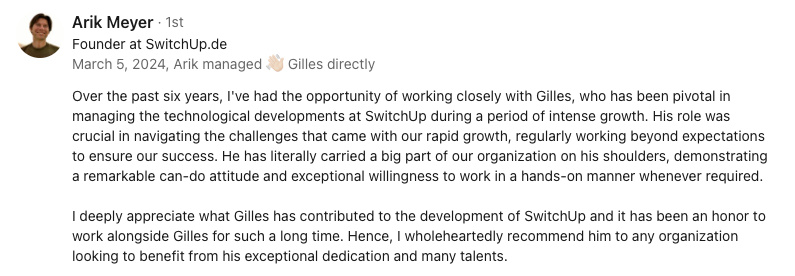Abstract:
The article provides a comprehensive guide for tech professionals leaving jobs in Europe, emphasizing that although the process can seem daunting due to paperwork, legalities, and mixed emotions, a well-planned and organized exit can be both smooth and advantageous. It covers essential steps such as thoroughly reviewing exit packages to capture all due benefits like unused vacation days, equity, and bonuses, and highlights the importance of collecting up-to-date statements, reference letters, and employment certificates—especially in countries where these documents are crucial for future employment. The guide stresses that initial severance offers are often negotiable, and shares real-life examples of employees who secured better deals by preparing documentation and seeking legal advice. Special attention is given to managing pensions, health insurance continuity, and the risks of overlooking restrictive clauses like non-competes, with practical anecdotes about workers who either lost benefits or successfully challenged unfair terms. The article also addresses the complexities of cross-border exits, explaining the need for certificates and careful tax and social security planning, and provides minimalist checklists and digital tool recommendations to streamline the process. Drawing from experiences in Berlin and Lisbon, the author illustrates how simple, targeted preparation and digital organization help avoid common pitfalls and ensure a stress-free transition, ultimately turning a potentially chaotic experience into an orderly and even rewarding one.
Leaving a tech job in Europe can feel like juggling paperwork, emotions, and a maze of rules. I’ve been there myself—navigating exits in Berlin and Lisbon, sometimes with a knot in my stomach and a spreadsheet open on my laptop. But with some planning, your exit can go smoothly and even feel satisfying. I’ll share the practical steps I’ve used to get every benefit I’d earned, avoid mistakes, and set myself up for whatever came next—whether that was a new role, a side project, or launching as an independent professional.
You’ll find advice on reviewing your exit package, gathering the right documents, and understanding what you’re owed—like unused vacation days, equity, and bonuses. I’ll also cover how to secure reference letters and employment certificates, handle paperwork if you’re moving across borders, and protect your ideas when restrictive clauses are in play. If you’re considering remote work or a move to another country, I’ll share tips for handling social security, health insurance, and taxes—so you don’t get lost in the admin maze.
Minimalist checklists and digital tools have helped me stay organized, and I’ll include real-life examples showing how a bit of prep pays off. By the end, you’ll know how to steer clear of common mistakes and pick up some helpful ways to make your exit less stressful—and maybe even put a bit more in your pocket.
First steps for launching on your own
If you’re planning to go independent right after leaving your tech job, the first days are crucial. I remember the mix of excitement and anxiety when I registered my own business in Lisbon—wondering if I’d missed a step or forgotten a document. Here’s a simple checklist to help you get started:
- Choose your legal entity: Decide if you’ll register as a sole trader, freelancer, or limited company. In Germany, I found the Einzelunternehmen route was quickest, while in Portugal, the ENI (Empresário em Nome Individual) was the simplest.
- Register with local authorities: File your registration with the relevant chamber of commerce or tax office. In Berlin, I had to visit the Gewerbeamt; in Lisbon, it was all online.
- Draft your first client contract: Use a simple template to cover scope, payment terms, and intellectual property. I always include a clause about payment deadlines and late fees—learned the hard way after a client delayed payment for months.
- Secure basic insurance: Professional liability and health insurance are must-haves. When I started out, I compared quotes from three providers and picked the one that let me adjust coverage as my business grew.
- Set up bookkeeping: Open a separate business bank account and choose a digital tool for invoicing and expense tracking. I use a simple Google Sheet for tracking income and expenses, but friends swear by tools like Xero or Debitoor.
- Register for VAT if needed: Check if your expected income requires VAT registration. In Germany, the threshold is €22,000; in Portugal, it’s €12,500.
Taking these steps in the first week made my transition much smoother and helped me avoid costly mistakes later. Now, let’s look at how to get the most from your exit package before you make the leap.
Getting the most from your exit package
Check your exit details
Leaving a tech job in Europe can feel like a whirlwind, but your exit package may offer more than you expect—if you know where to look. Usual items include:
- Unused vacation days (often paid out)
- Annual or performance bonuses
- Deferred pay
- Vested equity
- Relocation help
These benefits are often buried in HR docs or old emails. I always make a checklist and compare every benefit in my contract and company policies. Once, in Berlin, I found an overlooked education stipend worth €1,000 just by double-checking my paperwork. Missing even a small item can mean losing money or perks you’ve earned. Once you know what should be in your package, make sure your records match what the company says.
Collect final statements and benefits
Tech companies move fast, and payroll mistakes happen. I always ask for the latest statements for everything:
- Last payslip
- Summaries of stock options and equity
- Records for unused vacation
- Open expense reports
Mistakes are common, especially after company changes or layoffs. I once discovered a missing bonus only after checking every document. When your paperwork lines up, remember there’s one more thing that’s easy to skip but matters for your next job.
Secure reference letters and certificates
Official reference letters or employment certificates are crucial in countries like Germany, Switzerland, and Austria, where they’re often required for new positions. These are easiest to get before your last day, while HR and managers are still reachable. In Germany, for example, an “Arbeitszeugnis” is a legal right, and future employers may want both a regular and a detailed version. In France or the Netherlands, similar documents can speed up future hiring. I always ask for these early—once, a delayed certificate in Lisbon held up my next contract for weeks.
Get more than the standard offer
People often assume the first exit package is the only option, but that’s rarely true in tech. Legal minimums are just the start:
- Statutory minimum: Set by law, usually based on years at the company
- Tech companies: Sometimes offer salary extensions, more vesting, or extra benefits
- Collective agreements: Can provide even more in some cases
In my experience, documenting every benefit in a simple spreadsheet helped me track what was owed and spot discrepancies. When I left my role in Berlin, preparing a detailed list of my achievements helped me secure an extra month of severance. If the first offer feels low, you still have options.
Negotiate for a better deal
Even after the first offer, you can ask for better terms. Here’s what’s worked best for me:
- Get legal advice: Check your rights and find negotiation points.
- Show your achievements: Bring proof of your contributions—metrics, project outcomes, or client feedback. When I worked in investor relations, I used data on revenue growth to back up my case.
- Refer to industry standards: Use benchmarks or group agreements to push for more.
- Ask for extras: Longer salary payouts, more bonus vesting, or perks like job search support or keeping devices.
Many tech companies expect some negotiation. I’ve seen colleagues in Lisbon win extra months of pay just by coming prepared. Don’t overlook the small print—there can be hidden traps.
Watch the fine print
Missing small rules or deadlines can cost you benefits. I’ve heard stories of tech workers missing the chance to use stock options by not acting within a short window, or losing bonuses because of tricky contract terms. In France, someone lost a big bonus due to a non-compete clause after signing out. These stories are common and show why every clause matters. Once your package is settled, look at your benefits and perks.
Transferring and cashing out your benefits
Pension and retirement
Every European country handles pensions differently, so always check the local rules before you go. Europe protects your right to pension benefits you’ve earned, at least after three years, but moving a pension across borders can get tricky. I always ask for a formal statement of all my earned pension rights from my employer or the provider before I leave. This helps clarify what you have, and it’s needed if you ever claim from another country.
Here’s a quick look:
- Germany: Rights are frozen until retirement age
- France: You can claim from another country
- UK: Transfers abroad can happen, but with paperwork and maybe taxes
When I moved from Berlin to Lisbon, keeping digital copies of all my German pension documents saved me weeks of back-and-forth with local authorities. If you’re planning to move or become self-employed, keep all pension statements and correspondence. My checklist: save the pension statement, write down the provider’s contact, and keep exit documents. Pensions are just part of the equation—health insurance is another key area.
Health insurance
Letting deadlines pass or missing paperwork can leave you uncovered. Always tell your health insurance provider when you leave your job. You may need to pick between public and private options or switch to self-employed cover. For short gaps, the European Health Insurance Card (EHIC) or UK’s GHIC can bridge the time.
- Germany: Notify your insurer quickly; self-employed can pick public or private plans.
- UK: NHS care stays for residents, but private insurance usually ends unless you keep it yourself.
- Cross-border moves: Temporary health cards help with basic coverage.
I once had private insurance stop the day my job ended, leaving me scrambling for coverage before my next contract. Prepare your papers ahead to avoid stress. You’ll likely need proof of old insurance, a job exit letter, and new income info if moving to self-employment. Keeping these digital helps if you need to share with new providers. Don’t forget smaller perks and company devices either.
Other perks and devices
Most extras disappear after you leave, so use them first if possible. Things like wellness budgets, education funds, and lunch cards are “use-it-or-lose-it.” Company laptops or phones must usually go back, unless your deal says otherwise. Sometimes, senior or laid-off staff get to keep a device or get a partial stipend, but this is written in company policy. Always check your contract if you want to ask about perks. With benefits sorted, it’s good to look after your ideas.
Protecting your ideas and restrictive clauses
Side project ownership
It’s exciting to start a side project, but watch out—old contracts might give your ex-employer rights over what you create, even outside work. These rules are often hidden in your contract or later emails. Always check all versions of your agreement before you start something new. A standard clause might say the company owns ideas “related to their business,” made any time. Even if things seem okay, how you work matters, too.
If your project is close to your former employer’s field, take extra care:
- Use your own devices and accounts
- Don’t store code or work on company drives
- Keep a dated log showing when and where you worked on your project
This proof can help if you ever need to show who owns the work. If your project could overlap with what your old job did, written clearance from your employer is the safest. Even a quick email or simple note can settle things. Written records prevent future fights. Sometimes contracts limit your future work, too.
Non-compete and non-solicit rules
Non-compete and non-solicit clauses are common in European tech contracts, but they have limits. In France, a non-compete must come with pay (at least a third of your salary) and end after a reasonable time. In Germany, it must pay at least half your salary during the block, and not be too broad or long. In the Netherlands, courts often reject non-competes that are unfair. Courts often stand with the employee if a clause is too strict or isn’t paid for properly.
I once helped a friend in Berlin get a non-compete waived by showing it was too broad and offered no compensation. Sometimes, you can negotiate a waiver or better payout instead of accepting a restriction. These examples show that it pays to review and push back when needed.
Before leaving, gather every signed contract—especially ones about non-compete or non-solicit points. If you want to start a business in a similar area, consider asking a legal expert to check your contracts for risks. My quick checklist:
- Get all job agreements and changes
- Highlight non-compete, non-solicit, or confidentiality parts
- Talk to a legal professional if you plan a similar new job or business
For cross-border or remote working, local rules may differ. Good records and early advice help prevent big headaches.
Handling cross-border exits and remote work
Social security and tax residency
Leaving a tech job gets more complicated if you worked remotely or for a company based somewhere else. Social security is the first thing to clarify. Under an EU rule, your contributions normally go to just one country at a time, and the A1 certificate proves which. This document matters—it affects your health, pension, and jobless benefits later.
Tax residency is another area where remote work can surprise you. The 183-day rule says you may count as a tax resident where you spend most of your year—even if your boss is somewhere else. For instance, someone working from Portugal for a German firm may still owe Portugal taxes if they stay too long. This can even mean your company is taxed in that country. To avoid problems, ask HR or local offices early to check your status.
It’s safer to confirm everything before leaving. Gather your A1 certificate and key tax papers, and double-check with authorities if you’re not sure. A bit of effort now avoids big tax surprises later. Moving countries also affects your benefits and documents, so get everything sorted ahead.
Portability of benefits and documents
With your paperwork ready, claiming benefits abroad is easier. EU rules let you combine insurance times from different countries to qualify for jobless or pension rights. Before leaving, collect:
- A1 certificate for social security
- U1 or PD U1 for unemployment insurance time
- Pension statements from everywhere you’ve worked
- Health insurance certificates
When I moved from Berlin to Lisbon, having digital copies of all my German pension documents saved me weeks of hassle with local authorities. Missing one document can slow or shrink your benefits, so better to be thorough.
A simple checklist and digital tools help keep things tidy. Scan and save everything in a secure online folder, and write down each contact. If you’ll move again or go self-employed, knowing what to do next and having the right numbers will save hassle. Planning ahead lets you focus on your next step, not missing paperwork.
Minimalist handoff checklist and digital tools
One-page handoff checklist
Keeping it simple works well. A tight checklist helps you avoid forgetting something important. Here’s what I use:
- Collect all copies of your employment contracts, plus changes
- Download latest payslips, tax docs, and social security records
- Request official reference letters or job certificates
- Get statements for unused vacation, bonuses, equity
- Review and keep copies of intellectual property, non-compete, and confidentiality clauses
- Return or check if you can keep company devices
- Update list of contacts for HR, managers, and references
- Remove personal files from company systems and devices
- Register your new business entity (if going independent)
- Secure professional liability and health insurance
Breaking the process into steps made it feel manageable, even when I was overwhelmed by paperwork. If you’re worried about losing stability, know that careful planning can make the transition smoother and less stressful.
Digital tools for your exit
Project management tools like Trello or Asana help you see your tasks and track progress. HR platforms such as BambooHR sometimes have offboarding checklists with automatic reminders. I’ve used Google Sheets for my personal checklist, but for more complex cases, Confluence or Process Street let you centralize docs and share steps so nothing goes missing. Sharing access with others helps keep things moving even after you’ve left.
Real-world stories show that forgetting one document or action can lead to headaches. Keeping your checklist and digital records tidy protects your future and your peace of mind.
Lessons from real-world handoff pitfalls
Common pitfalls
Legal rules can trip up even careful people. I know the anxiety of leaving a stable role, but also the excitement of new freedom. Stories pop up often about tech staff losing valuable stock options because they missed a 30-day window. Others face health coverage gaps just from slow insurance handovers, ending up without care for weeks. These moments are stressful—I remember the sinking feeling when I realized I’d missed a deadline for a bonus payout.
Cross-border agreements come with surprises, especially with non-compete rules. Some workers have been stuck with long spells without a job because they didn’t review or challenge a non-compete. Courts in France have upheld non-competes with the right payment, keeping people out of their field for months. In Germany, courts can enforce these if the law is followed. Ignoring these can mean unpaid breaks between jobs, so review and challenge them if you can.
Stock options across countries are even more confusing. Equity set under foreign law can bring surprise tax bills or legal trouble. For example, someone moving for a new job might discover that using old stock options triggers taxes they didn’t expect. One good tip: double-check the tax and legal rules for your company shares if moving across borders. A bit of paperwork now saves headaches and costs later.
Success stories and minimalist strategies
Sometimes, a good handover brings extra rewards. Tech workers have won better severance, longer benefits, or extra bonus vesting just by showing up with full documentation and legal advice. I’ve seen colleagues get extra months of pay or keep perks because they came to talks with clear records and facts. Being prepared and organized can bring a smoother exit and better deal than just taking what’s offered.
Managing stress and uncertainty is part of the process. I found that focusing on the basics—contract copies, benefit records, and any limits on future jobs—kept the paperwork light and stopped last-minute problems. Minimal, targeted checklists help turn what could be chaos into a calm process, wherever your next stop is.
Having handled work transitions in Berlin and Lisbon, I learned that simple checklists and document reviews reduced stress and made exits go more predictably, even when local rules shifted. Focusing on the essentials helped me sleep better at night, knowing I hadn’t left anything important behind.
Leaving a tech job in Europe might look tricky, but with good organization and prep, it soon feels manageable—and maybe even helps you get ahead for what comes next. Checking your exit package, gathering documents, and knowing your rights make a big difference for your money, health, and new chances. Protecting your ideas and reading the fine print helps avoid future hassles, especially if you want to start fresh or move abroad. Minimalist checklists and digital tools keep stress down so you leave nothing behind. Every detail matters, but staying focused keeps things easy and more rewarding. Sometimes the tiniest trick makes the biggest difference.














